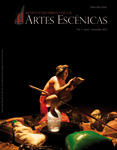Autores/as
Resumen
El siguiente escrito aporta al debate sobre la construcción del saber y la identidad profesional del profesor de teatro. Sobre la información recogida en las clases de las materias prácticas de la Licenciatura en Artes Escénicas de la Universidad Pedagógica Nacional, apoyado en una visión antropológica del saber y en la metodología de la Teoría de la Acción didáctica Conjunta, plantea que los saberes y los procesos identitarios se configuran en planos sociales, en los que el cuerpo, las interacciones y las mediaciones centradas en el cuerpo, son instancias que, producen el sentido de la labor profesional.
Citas
Alfonso, M. (2008). “Complejidades en la investigación de la transformación del saber artístico en saber escolar”. En: Revista Pensamiento, palabra y obra. Facultad de Artes. Universidad Pedagógica Nacional. Bogotá.
Bautier, E. (1997). Pratiques langagières, activités des éleves et apprentissages. Colloque Défendre et Transformer l´Ecole pour tous. Marseille.
Brousseau, G. (1990). “¿Qué pueden aportar a los enseñantes los diferentes enfoques de la didáctica de las matemáticas? En: Enseñanza de las ciencias: revista de investigación y experiencias didácticas, Vol. 8, No. 31: 259-267.
Bruner, J. (1991). Actos de significado. Más allá de la revolución cognitiva. Madrid: Alianza.
Buysse, A. (2007). Le théatre: au-delá jeu. Cahiers de la section des sciences de l´education. Suisse: Université de Genéve.
Chevallard, Y. (1991). La transposición didáctica. Grenoble: La pensé sauvage.
De Amore, B. (2005). Bases filosóficas, pedagógicas y conceptuales de la Didáctica de la Matemática. Barcelona: Reverte.
De Toro, F. (1992). Semiótica del teatro. Del texto a la puesta en escena. Buenos Aires : Galerna.
Erikson, E. (1983). Infancia y sociedad. Buenos Aires: Horme-Paidós.
James, W. (1989). Los principios de la psicología. México: Fondo de Cultura Económica.
Laclau, E. (1996). Emancipación y diferencia.Buenos Aires: Ariel.
Lave, J. & Wenger, E. (1991). Situated learning: Legitimate peripheral participation. Cambridge: Cambridge University Press.
Mead, G. H. (1974). Mind, Self & Society. Chicago.
Rickenmann, R. (2005). Activité conjointe et significations: une analyse sociosémiotique des interactions dans les établissements médicosociaux pour personnes âgées.
Sensevy, G. & Mercier, A. (2007). Agir ensemble. L’action conjointe du professeur et des élèves dans le système didactique. Rennes: PUR.
Suchman, L. (1987). Plans and situated actions: the problem of human/machine communication. Cambridge: Cambridge University Press.
__________. (1987). “Those who understand: Growth in Teaching”. En: Educational researcher, Vol. 15, No. 2.
Stanislavsky, C. (2009). El trabajo del actor sobre sí mismo en el trabajo creador de la encarnación. Barcelona: Alba.

 PDF
PDF
 FLIP
FLIP









